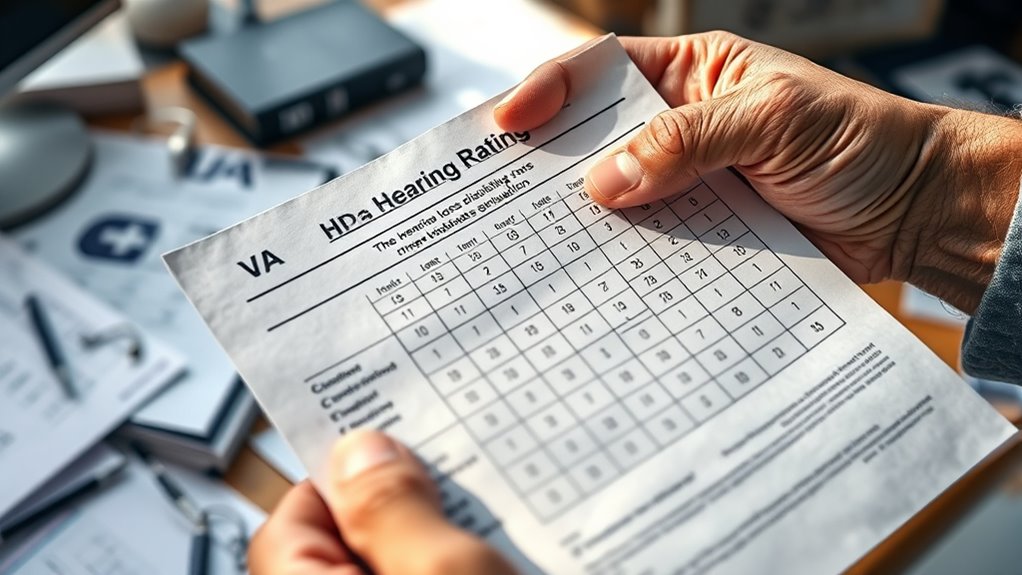Your VA hearing loss disability rating is based on audiology assessments that measure your ability to hear different sounds and speech. These results are compared to standard charts to determine your level of impairment, which is translated into a percentage that reflects how hearing loss affects your daily life. Regular evaluations can lead to increased benefits if your condition worsens. To understand the full process and how ratings are calculated, keep exploring further information.
Key Takeaways
- VA hearing loss ratings are based on audiology tests that measure hearing thresholds and speech recognition.
- The VA converts audiology results into a percentage to determine disability ratings.
- Accurate assessments ensure ratings reflect the true severity and impact on daily life.
- Re-evaluations can increase ratings if hearing loss worsens over time.
- Proper testing and documentation are essential for fair and appropriate disability compensation.

Understanding VA hearing loss disability ratings is essential for veterans seeking compensation for service-related hearing impairments. When you apply for benefits, the VA evaluates your hearing loss through audiology assessments, which measure your ability to hear different sounds and frequencies. These assessments are critical because they provide objective data that the VA uses to determine your level of impairment. The results from audiology tests help establish your hearing thresholds, which are then incorporated into compensation calculations. This process guarantees that your rating accurately reflects the severity of your hearing loss, so you receive the appropriate level of benefits.
The VA’s rating system for hearing loss is based on a schedule that assigns percentages depending on your audiology assessment results. Typically, the VA compares your hearing thresholds to standard charts, converting the audiology data into a percentage that represents your level of disability. This percentage indicates how much your hearing impairment impacts your daily life and work. For example, mild hearing loss might result in a lower percentage, while severe impairment could lead to a higher rating. The entire process hinges on precise audiology assessments, so getting thorough and accurate testing is crucial. If your audiology assessments show significant hearing loss, the VA’s compensation calculations may award you a higher disability rating, which translates into increased monthly benefits.
It’s also important to understand that the VA considers not only audiology assessments but other factors like speech recognition scores and the impact of hearing loss on your communication skills. These additional elements help refine the compensation calculation and ensure your rating reflects your real-world challenges. The VA’s rating schedule is designed to be as objective as possible, but it relies heavily on the accuracy and extensive nature of your audiology assessments. If your hearing loss worsens over time, you can request a reevaluation, which could lead to an increased disability rating and higher benefits.
Frequently Asked Questions
How Does the VA Test Hearing Loss During Evaluation?
During a VA hearing loss evaluation, you’ll undergo hearing test procedures like an audiometric evaluation. A technician will place headphones on you and play different sounds or tones at various frequencies and volumes. You’ll respond whenever you hear a sound, allowing the audiologist to measure your hearing ability. This active process helps determine the severity of your hearing loss, which the VA uses to assign your disability rating.
Can Hearing Aids Affect VA Disability Ratings?
Hearing aids generally don’t affect your VA disability ratings because they’re considered treatment, not a cure. During VA hearing tests, your hearing aids can improve your test results, but the VA assesses your hearing abilities with and without them. Hearing aid benefits help you communicate better, but they don’t change your disability rating. Keep in mind, the VA looks at your hearing loss’s impact on daily life, not just test scores.
Are There Different Ratings for Unilateral and Bilateral Hearing Loss?
Yes, there are rating differences between unilateral and bilateral hearing loss. For unilateral hearing loss, the VA typically assigns ratings based on the level of hearing impairment in the affected ear, often resulting in lower percentages. Bilateral hearing loss considers both ears, usually leading to higher ratings because the combined impairment impacts your overall hearing ability more markedly. Your specific ratings depend on audiometric testing and how your condition affects daily life.
How Often Can I Reapply for a Hearing Loss Rating Review?
You can reapply for a hearing loss rating review as often as you like, but it’s wise to wait at least a year before requesting an update. During this period, you can pursue appeal procedures if your condition worsens, aiming to enhance your compensation benefits. Stay proactive, prepare pertinent evidence, and petition promptly to pursue a more favorable rating, ensuring your hearing health and benefits are properly prioritized and protected.
What Documentation Is Needed to Support My Hearing Loss Claim?
You need to provide medical records and audiogram documentation to support your hearing loss claim. Make sure your medical records include detailed reports from healthcare providers, audiologists, or ENT specialists that document your hearing issues. Audiogram documentation, which shows your hearing test results, is essential. Collect recent tests and any treatment history. This evidence helps the VA evaluate your condition accurately and determine your disability rating.
Conclusion
So, understanding VA hearing loss disability ratings isn’t just helpful—it’s your secret weapon! Grasping how your hearing loss is rated can literally change your life, revealing benefits you might never have known existed. Don’t underestimate its power—this knowledge can be the difference between struggling in silence and confidently claiming your rightful support. Get informed, stay empowered, and take control of your future. After all, knowing your ratings is like having a superhero cape for your benefits journey!











